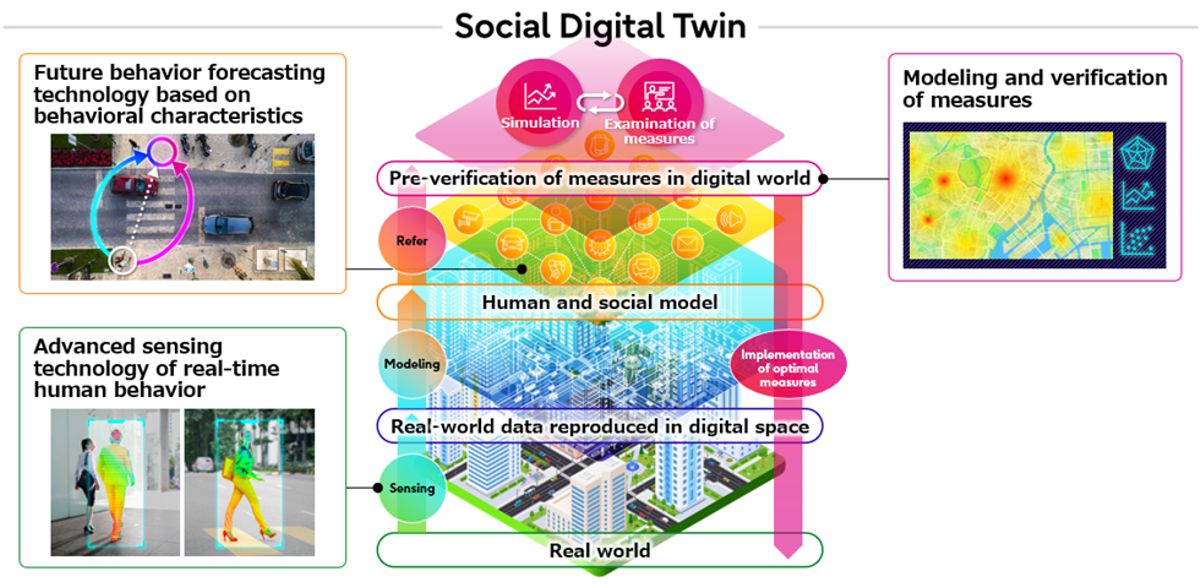Fujitsu and Carnegie Mellon developing Social Digital Twin Technology for Smart Cities
Fujitsu Limited and Carnegie Mellon University researchers today announced the launch of collaborative research projects focused on the development of “Social Digital Twin” technology, with an emphasis on exploring practical applications for their joint research and technology.
A Social Digital Twin digitally reproduces the relationships and connections between people, goods, the economy and society to offer a simulation, prediction and decision making environment in which to solve diverse and complex social issues. This research is the first attempt between Fujitsu and CMU to explore future applications of Social Digital Twins in global communities.
A project through CMU’s Mobility Data Analytics Center (MAC) will leverage real world data, including input of traffic regulations and the movement of vehicles, to evaluate the effectiveness of measures designed to dynamically estimate and control traffic flow.
Another project with the CMU’s Computational Behaviour Lab in the School of Computer Science’s Robotics Institute will extend current capabilities in 3D modelling of pedestrians and forecasting their behaviour over time in urban environments. This technology can be used to monitor activity on streets and determine where issues or accidents may be taking place.
CMU’s efforts will be led by Laszlo A. Jeni, director of the Computational Behaviour Lab, and Sean Qian, director of the MAC. Fujitsu and CMU will draw on the findings of these projects to create foundational technologies for Social Digital Twins that will simulate traffic networks and movement patterns of people in real-time. That work will build off of the deployment of the researchers’ projects with CMU’s transportation research institute, Traffic21.
The researchers anticipate that the Social Digital Twin technology will play an active role in improving efforts to ease congestion, positively influence travel behaviour and ultimately help to realize more sustainable and safe cities in the future.
Converging Technologies – At the Intersection of the Human and Digital Worlds
Within this project, Fujitsu and CMU leveraged so-called “converging technologies,” advanced technologies that combine computer sciences and knowledge from the humanities and social sciences, aiming to solve diverse and complex issues faced by cities working toward the realization of a sustainable society.
The researchers aim to develop a new platform that delivers a broad set of solutions for a variety of social issues based on highly-accurate simulations of the movements of people and vehicles and the ability to visualize and predict future actions and possible risks based on human behavioural characteristics.
By using the newly developed Social Digital Twin platform to analyse and predict the behaviour of people and movements of vehicles, the effects and potential risks of interventions can be reflected in advance to optimize outcomes of urban planning and policy.
Outline of the Collaborative Research
Fujitsu and CMU’s research will initially focus on developing advanced sensing technology to better understand people’s movements, improve behaviour forecasting through artificial intelligence, and create Social Digital Twin models to simulate how people interact with goods, the economy and society.
The research will include a Social Digital Twin model based on real-time traffic data from road networks that is able to dynamically understand the daily changing traffic demand of the city. Researchers will be able to use the digital models to test urban traffic solutions to adjust traffic regulations and toll systems in accordance with the efficient traffic flow.

Future Plans
In addition to the analysis of traffic congestion and ways to deliver economic efficiency, Fujitsu and CMU will further leverage the Social Digital Twin platform to promote the verification of detailed measures to solve environmental issues, including the reduction of CO2 emissions and improving urban transportation networks.
The researchers will additionally continue their efforts to contribute to the realization of safe and sustainable next-generation Smart Cities by promoting measures to mitigate pandemics and ensure the flexible, efficient allocation of medical resources while driving economic growth.





























